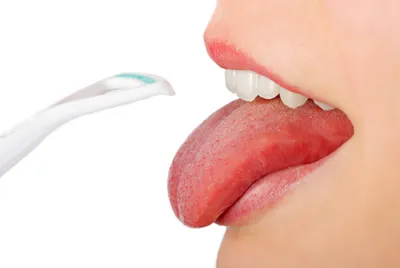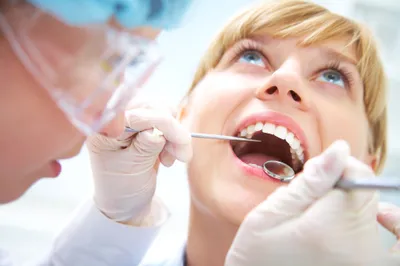Do you suffer from breath so bad no mint or pack of gum can keep it under wraps?
Halitosis can hinder your life romantically, socially, and professionally. However, there are effective ways to banish bad breath…
1. Brush Up On Oral Hygiene
Poor oral hygiene will eventually lead to bad breath. Think of the inside of your mouth as a breeding ground for bacteria. The tongue and crevices within offer a playground for the millions of organisms that reside in there. However, you can literally scrape foul-smelling bacteria from the crevices between your gums and atop your tongue with regular brushing, flossing, and by using a store bought tongue scraper (or the one on the back of your toothbrush) daily to banish any lingering bacteria from your mouth.
2. Hydrate
You already know that hydration is important for many bodily functions. Well, oral health (and sweet smelling breath) depends on a moist mouth to flush bacteria and dilute the offensive odor of volatile sulfur compounds (or VSCs) that can cause halitosis.
3. Look to Your Diet
Just as eating certain foods can cause foul smelling odors to secrete from other areas of the body, rancid breath can likewise result from eating high sulfur foods. For instance, foods like Brussels sprouts, cabbage, cauliflower, and garlic cause volatile sulfur compounds to be absorbed in the blood, where they travel to the lungs and emerge through exhalations and speech.
4. What to Eat Instead
While certain foods high in VSCs may cause bad breath—other high water foods may banish halitosis. For instance, vegetables like cucumber or celery may help remove remaining food bits and plaque bacteria as they scrape against the inside of your mouth and increase saliva levels. Eating a yogurt that’s high in probiotics (or healthy bacteria) can also overcome odor-producing bacteria in your mouth and on your tongue.
5. Banish Bad Habits
Excessive smoking (or chewing tobacco) will also cause bacteria overgrowth and oral issues—like damaged gums, infection, and inflammation—inside your mouth. Combined smoking with too much coffee drinking and oxygen flow becomes obstructed in the mouth, creating a prime breeding ground for all sorts of harmful bacteria.
6. Certain Medications
Certain prescription and over-the-counter medications can also result in foul breath if the drugs have a dehydrating effect on the inside of your mouth. If you feel parched after taking medications, take them with a large glass of water and make a point to drink more water throughout the day.
7. Vitamin Boost
Vitamins C and D are beneficial for your health in many ways, but both also protect your mouth and gums from odor-causing bacterial growth, which can also lead to gingivitis and other gum diseases. Implement a vitamin supplement or incorporate high vitamin C foods (i.e., citrus and berries) and vitamin D foods (i.e., milk and yogurt) into your daily diet to stop bad breath.
8. Visit Your Dentist
If your gums are painfully inflamed, bleeding, or sore don’t put off a visit to your dentist. You may have a periodontal infection or disease (gingivitis) that’s causing your chronic halitosis. If left untreated, a minor infection can cause a more serious health problem.











